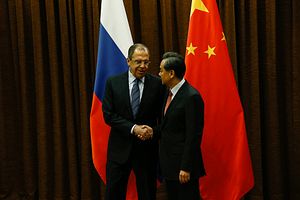On March 26, China’s Foreign Ministry announced that State Councilor and Foreign Minister Wang Yi would visit Russia from March 27 to 28, both to set the stage for the annual exchange of visits by top leaders and to “step up bilateral cooperation in key areas.” It would be Wang’s first trip abroad since getting a position on China’s State Council at the recently concluded annual session of the National People’s Congress. It would also be a show of Chinese support for Russia in the face of a ballooning diplomatic crisis linked to the use of a nerve agent against a Russian ex-spy in the United Kingdom.
Or it would have been, if Wang had made the trip. On the afternoon of March 27, the day Wang was scheduled to arrive in Moscow, the Russian Foreign Ministry suddenly announced that his trip had been postponed, citing changes in the schedules of Russian leaders. According to the Chinese Foreign Ministry announcement from the day before, Wang had been planning to meet with his Russian counterpart, Sergey Lavrov, and unspecified “Russian leaders.”
The cancellation of the visit came as a number of Western countries announced they were expelling Russian diplomats in retaliation for the attempted murder of a former Russian spy, Sergei Skripal, on British soil. Skripal and his daughter – along with 36 other individuals, including U.K. police and emergency responders – were poisoned in Salisbury using the nerve agent Novichok. The British government blamed Russia for the attack; in response, governments across Europe, as well as the United States and Australia, took part in what British Prime Minister Theresa May called the “largest collective expulsion of Russian intelligence officers in history.” By March 27, over two dozen countries had expelled over 100 Russian diplomats, with the United States and United Kingdom accounting for the lion’s share of expulsions at 60 and 23, respectively.
The last-minute rescheduling of Wang’s visit – less than a day after the timing was confirmed by Beijing – suggests Russia is now scrambling to respond.
Had the visit gone ahead, it would have been a much-needed show of support for Russia. China has pointedly avoided holding Moscow responsible for the attack on Skripal, instead denouncing the use of chemical weapons in general while calling for an investigation into this specific incident. During a heated emergency sessions of the United Nations Security Council on March 14, at which the U.K. ambassador accused Russia of being behind the attack, China’s UN Ambassador Ma Zhaoxu spoke only briefly, calling for “relevant authorities” to “properly handle the issue through the proper channels.” Ma said he hoped “an impartial investigation would be held, based on facts and relevant international rules, and that it would lead to an evidence‑based conclusion that could stand the test of history,” according to a press release from the UN.
On March 27, when asked about the expulsions of Russian diplomats in a regular press briefing, Chinese Foreign Ministry spokesperson Hua Chunying made a similar statement:
We are closely following the development of the current situation. China is firmly opposed to any use of chemical weapons. We believe that the “Skripal incident” should be properly resolved through the dialogue between the U.K. and Russia based on getting the facts straight. The relevant countries should earnestly abide by the international law and the basic norms governing international relations and avoid taking any step that would escalate the confrontation.
She ended her comment, however, with a call for countries to “discard the Cold War mentality,” a phrase often used to scold the United States and its Western partners (and never Russia).
China has used similar tactics in the past when friendly governments are accused of unsavory actions. In 2010, when North Korea was accused of sinking the ROKS Cheonan, China largely ignored the findings of an international investigation and instead noted North Korea’s denial of responsibility. In 2014, when Russia was accused of supplying the missile system used to shoot down a civilian plane over Ukraine in 2014, killing nearly 300 people, China again demurred on assigning responsibility, instead (you guessed it) calling for an investigation. In 2015, when a Dutch investigation held Russia responsible, China was silent.
China’s calls for “impartial” investigations in such instances effectively support the accused parties. In the previous cases cited above, both North Korea and Russia dismissed the charges against them, and the supporting investigations, as biased and politically motivated. Russia has done the same with the U.K.’s recent accusations in the Skripal case, denying all responsibility. While China will not explicitly take a stand, its ever-so-subtle implication that the British investigation is not acceptable evidence is an act of support for Russia.
Chinese media, meanwhile, was less subtle. The Global Times, never one to shy away from a controversy, published an editorial slamming the diplomatic expulsions as “nothing more than a form of Western bullying that threatens global peace and justice.” Claiming that “The British government did not provide evidence that linked Russia to the crime,” the article echoed Beijing in calling for “an independent investigation.”
“It is beyond outrageous how the US and Europe have treated Russia… Right now is the perfect time for non-Western nations to strengthen unity and collaborative efforts among one another,“ the article continued.
Wang’s visit to Russia would have been a chance to do just that, as the Global Times pointed out in another article (which, curiously, claimed that Wang “began his two-day working visit to Russia on Tuesday,” despite the Russian announcement that the trip had been postponed). However, Moscow will not, after all, get to enjoy the optics of Wang shaking hands with Russian leaders just days after much of Europe expelled Russia’s diplomats.
Expect the trip to be rescheduled, though, after the immediate crisis has ebbed somewhat.

































